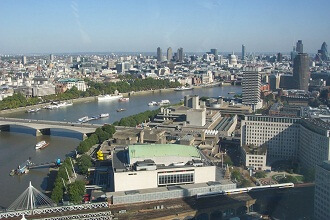Property Developer Buys ‘Air Rights’ to Safeguard Building Views
Property Developer Buys ‘Air Rights’ to Safeguard Building Views
 The obscure matter of ‘air rights’ has recently made its way into the mainstream media.
The obscure matter of ‘air rights’ has recently made its way into the mainstream media.
To guarantee unobstructed views for the lifetime of his luxury skyscraper in Melbourne, property developer Jeff Xu has bought the ‘air rights’ of the space alongside the 39-storey high-rise.
“When you look out there it’s like the Monopoly Board of Melbourne’s icons . . . From St Patrick’s Cathedral, Parliament, the Treasury Building, round the G’ [Melbourne Cricket Ground] and right from across to the Dandenongs, over Melbourne’s leafy suburbs,” Jeff explained.
“It’s an exceptional thing, but the view is so precious it was fundamental to this project,’ said Jeff Copolov of architectural firm Bates Smart.
The decision to purchase the surrounding air rights will safeguard views for 138 apartments. Construction of the building is expected to be completed by 2020.
More private developers are seeking to purchase air rights
Interest in buying air rights is growing in the UK.
Arshad Bhatti, managing director at Apex Housing Group, which has a particular interest in buying airspace, says: “If you have an expensive piece of land in any city centre in the world, you use it, but we have so much unused space in London and owners are unaware they can sell it.”
“We are working with local authorities across London and expect airspace development projects to help bridge the gap between demand and supply of new homes in London – crucially with minimum lead times, and offering maximum value for property owners,” he said.
Apex thinks there may be potential for around 140,000 new homes above London’s public buildings, worth in the region of £74bn.
Gauging what’s available using high tech
Meanwhile, property agency Knight Frank says as many as 41,000 new homes could be built in central London using untapped rooftop development space.
Knight Frank says 23,000 buildings in London’s central zones 1 and 2 would be suitable for rooftop development, with airspace having a potential value of £51bn.
The company has made use of a tool called Skyward which analyses data from the Ordnance Survey and enables an analysis of the impact of making buildings taller, such as light and view restrictions. Skyward identifies only those structures which, if they were increased in height, would not tower over nearby buildings, meaning the skyline would not be altered.
Ian McGuinness, head of geospatial at Knight Frank, said using such 3D mapping technology means findings can easily be read against other geographies, including to client land ownership portfolios. “We can now say where the opportunities are, how much value they unlock, and which landowners are best placed to drive this transformation,” he explained.
Their research comes in the wake of the Government’s housing white paper, which sought to set out measures to tackle the UK’s housing crisis.
The white paper called for high-density housing in in locations “where buildings can be extended upwards by using the ‘airspace’ above them.”
Top of the shops could ease crisis
Elsewhere, the Federation of Master Builders (FMB) has quizzed MPs and found that the vast majority (94%) believe that the often dormant space above shops could be developed.
Brian Berry, the chief executive of the FMB, said:
“It is estimated that as many as 300,000 to 400,000 new homes could be created by making use of empty spaces above shops on our high streets . . . This is space just waiting to be turned into residential accommodation.”
Housing boom for London suburbs
Mayor of London Sadiq Khan’s London Plan has paved the way for the capital’s suburbs to experience a surge in housebuilding, as rules protecting local character will be lifted.
The plan says one-third of new housing will be built on small sites, including in back gardens and upward extensions of existing houses, apartment blocks and shops.
It says more than 250,000 homes need to be built in 13 outer suburbs as part of a new London-wide housebuilding target of 650,000 by 2029.
Expert legal advice for house builders
Our New Homes team acts for both local and national housebuilders in the sale of completed developments to both owner occupiers and investors.
To find out more, contact our New Homes Division on 03456 381381 or email us at newhomes@ibblaw.co.uk.
The New Homes Division is part of a wider residential development team that also advises on the acquisition of residential development sites, infrastructure agreements and Housing Association disposals so as a firm IBB can offer a full and complete service to our housebuilder and residential developer clients.

